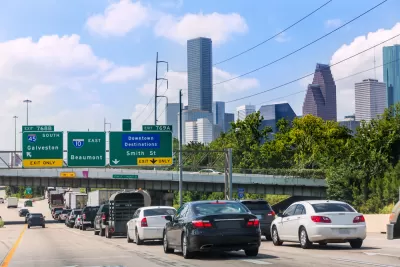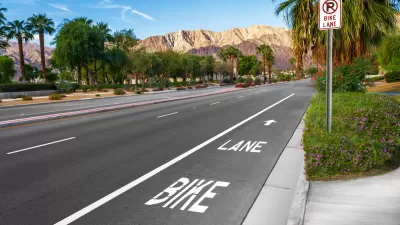Fatal crashes killed slightly fewer people in 2022 than in 2021, but deaths are still significantly higher than in 2019.

Preliminary data from Houston brings a ray of hope for road safety advocates, reports Jay R. Jordan for Axios. As traffic deaths continue to rise across the United States, Houston saw fewer deadly crashes in 2022 than the year before. However, these numbers are still above pre-pandemic levels, Jordan notes.
Crashes killed 317 people in Houston last year, down from 332 in 2021 and up from 266 in 2019, the year the city implemented its Vision Zero policy, which calls for an end to traffic deaths by 2030. Since then, the number of traffic deaths on city-controlled streets has declined slightly, while deaths on state-managed roads went up.
Like other U.S. cities that grew after the rise of the automobile, Houston has historically designed its roads for fast traffic, largely ignoring pedestrian infrastructure. The Texas Department of Transportation (TxDOT) has pledged to cut traffic deaths in half by 2035 and eliminate them by 2050, but critics of the department’s approach to traffic safety point out that the messaging used by the agency still predominantly places the responsibility on pedestrians and cyclists, ignoring the structural reasons for fatal crashes.
FULL STORY: Houston's traffic deaths decline slightly in 2022

Americans May Be Stuck — But Why?
Americans are moving a lot less than they once did, and that is a problem. While Yoni Applebaum, in his highly-publicized article Stuck, gets the reasons badly wrong, it's still important to ask: why are we moving so much less than before?

Using Old Oil and Gas Wells for Green Energy Storage
Penn State researchers have found that repurposing abandoned oil and gas wells for geothermal-assisted compressed-air energy storage can boost efficiency, reduce environmental risks, and support clean energy and job transitions.

Placekeeping: Setting a New Precedent for City Planners
How a preservation-based approach to redevelopment and urban design can prevent displacement and honor legacy communities.

San Francisco’s Muni Ridership Grew in 2024
The system saw its highest ridership since before the Covid-19 pandemic, but faces a severe budget shortage in the coming year.

Colorado Lawmakers Move to Protect BRT Funding
In the face of potential federal funding cuts, CDOT leaders reasserted their commitment to planned bus rapid transit projects.

Safe Streets Funding in Jeopardy
The Trump administration is specifically targeting bike infrastructure and other road safety projects in its funding cuts.
Urban Design for Planners 1: Software Tools
This six-course series explores essential urban design concepts using open source software and equips planners with the tools they need to participate fully in the urban design process.
Planning for Universal Design
Learn the tools for implementing Universal Design in planning regulations.
Heyer Gruel & Associates PA
City of Moreno Valley
Institute for Housing and Urban Development Studies (IHS)
City of Grandview
Harvard GSD Executive Education
Salt Lake City
NYU Wagner Graduate School of Public Service
City of Cambridge, Maryland





























